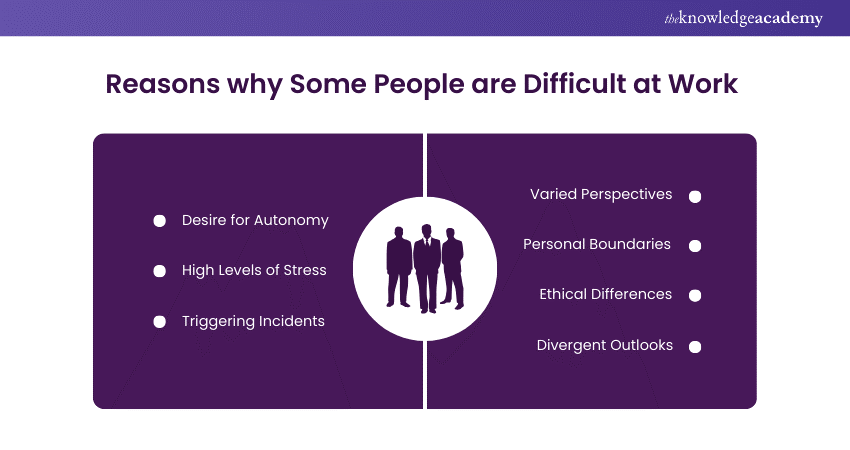We may not have the course you’re looking for. If you enquire or give us a call on 01344203999 and speak to our training experts, we may still be able to help with your training requirements.
We ensure quality, budget-alignment, and timely delivery by our expert instructors.

When Louis Armstrong said “What a wonderful world” - it resonated with us. However, what good sir missed was to mention certain people who are rather a tad bit difficult to deal with. This element has a lot to do with personal characterisations. Knowing How to Deal with Difficult People might solve a lot of problems in your workplace.
Table of Contents
1) Introduction to Difficult Behaviour
2) Reasons Why are Some People Difficult at Work
a) Varied Perspectives
b) Personal Boundaries
c) Ethical Differences
d) Divergent Outlooks
e) Desire for Autonomy
f) High Levels of Stress
g) Triggering Incidents
3) Tips to Deal with Difficult People at Work
4) Conclusion
Introduction to Difficult Behaviour
Navigating workplace dynamics can often feel like walking a tightrope, especially when you encounter difficult personalities. Types of Difficult People at Work can disrupt harmony, lower morale, and affect productivity. Understanding and managing these interactions is essential for maintaining a positive and productive work environment.
Every single person is dealing with their personal battles. At times, it truly gets difficult to bring about their professional face in the forefront. However, it gets difficult for the person in the receiving end too, if this behaviour persists over a long span. Therefore, it is suggested that people facing these issues work on themselves for a better overall functionality!
Reasons Why Some People Are Difficult at Work
Empathy goes a long way when things go downhill. Understanding the underlying reasons why some individuals exhibit difficult behaviour can be the first step toward managing these interactions effectively. Here are several common reasons:

1) Varied Perspectives
Everyone brings a unique perspective to the workplace, influenced by their background, experiences, and values. These differences can sometimes lead to misunderstandings and conflicts, making some individuals seem difficult to work with.
2) Personal Boundaries
Some people have different comfort levels regarding personal boundaries. A person who feels their boundaries are being encroached upon might react defensively or aggressively, making them appear difficult.
3) Ethical Differences
Ethical standards can vary greatly among individuals. Disagreements over what is considered right or wrong can lead to tension and make working relationships challenging.
4) Divergent Outlooks
Differing visions and approaches to work can cause friction. When team members have opposing views on how tasks should be completed, it can lead to conflicts and perceptions of difficult behaviour.
5) Desire for Autonomy
Some individuals have a strong desire for independence and control over their work. When this autonomy is threatened, they may become resistant or combative, creating a difficult work environment.
6) High Levels of Stress
Stress is a significant factor that can exacerbate difficult behaviour. People under pressure may have shorter tempers and reduced patience, making them harder to deal with.
Learn essential techniques for prioritising tasks and increasing productivity with our Time Management Training – join today!
7) Triggering Incidents
Past experiences and specific triggers can influence behaviour. An incident that reminds someone of a negative past experience can cause them to react strongly, leading to difficult interactions.
Tips to Deal with Difficult People at Work
Dealing with difficult colleagues requires a mix of self-awareness, communication skills, and strategic approaches. Here are expert tips to help you navigate these challenging interactions:
1) Reflect on Your Own Behaviour
Before addressing someone else's difficult behaviour, reflect on your own actions and attitudes. Consider whether your behaviour might be contributing to the conflict and what you can do to improve the situation.
2) Establish Boundaries
Setting clear and respectful boundaries is crucial. Let your colleagues know what behaviours are acceptable and which are not. This can help prevent misunderstandings and reduce conflict.
3) Maintain Calm and Professionalism
Staying calm and composed is essential when dealing with difficult people. Reacting emotionally can escalate the situation. Maintain professionalism, even in the face of provocation.
Master effective communication with our Active Listening Training – register today!
4) Practice Active Listening
Active listening involves fully concentrating on what the other person is saying, acknowledging their feelings, and responding thoughtfully. This approach can help defuse tension and show that you respect their perspective.
5) Demonstrate Empathy
Showing empathy means understanding and sharing the feelings of others. By putting yourself in their shoes, you can better appreciate their viewpoint and respond more compassionately. Techniques from Neuro-Linguistic Programming can further enhance your ability to empathize by improving your understanding of others' perspectives and refining your communication skills.
6) Have Private Conversations
Addressing issues in private can prevent embarrassment and defensiveness. Speak to the individual away from the public eye, where you can discuss the matter openly and honestly.
7) Seek Compromise
Finding a middle ground can often resolve conflicts. Be willing to negotiate and compromise, ensuring that both parties' needs are considered and met to some extent.
8) Consult Your Supervisor
If the situation does not improve, seek advice from a supervisor or manager. They can provide guidance, mediate the conflict, or take appropriate action to resolve the issue.
9) Prioritise Self-Care
Dealing with difficult people can be draining. Prioritise your well-being by engaging in activities that reduce stress and promote relaxation. This can help you maintain your composure and resilience. Additionally, incorporating NLP Training can provide you with strategies to handle challenging interactions more effectively and with less stress.
10) Use Humour Appropriately
Humour can be a powerful tool to lighten the mood and defuse tension. However, it must be used carefully to avoid offending or belittling the other person. Light-hearted jokes can ease the atmosphere and foster better interactions.
11) Persistence in Practice
Changing behaviour takes time and persistence. Continually apply these strategies, even if progress seems slow. Consistent effort can eventually lead to improved relationships.
Learn how to deal with stress in the workplace in our Stress Management Course – join now!
12) Seek Support from Colleagues
Lean on supportive colleagues for advice and encouragement. They can offer different perspectives and help you cope with the stress of dealing with difficult people.
13) Minimise Interaction if Possible
If possible, limit your interactions with difficult individuals. This doesn't mean avoiding them completely but reducing contact can help maintain your peace of mind and productivity.
14) Evaluate Your Responses
After interactions with difficult colleagues, take time to evaluate your responses. Consider what worked, what didn’t, and how you can improve in future encounters.
The job market has changed, but "A Way Back to Work" shows you how to adapt and thrive in this new landscape.
Conclusion
Knowing How to Deal with Difficult People at work is an inevitable part of professional life. However, it does not have to be a source of constant stress. By understanding the reasons behind their behaviour and applying these tips, you can navigate these challenging interactions more effectively.
Learn to identify and handle conflict effectively in the workplace with our Course on Dealing with Difficult People – register now!
Frequently Asked Questions
How to Communicate with a Difficult Person?

To begin with, identify the problem. Followed by listening to them. You need to control your emotions and find a common ground to interact with these people.
How to Stop Being a Difficult Person?

You are halfway there, if you have already identified that there is an issue. Introspection is the biggest step forward. Practicing proactiveness, active listening, controlling emotions can help you further.
What are the Other Resources and Offers provided by The Knowledge Academy?

The Knowledge Academy takes global learning to new heights, offering over 3,000 online courses across 490+ locations in 190+ countries. This expansive reach ensures accessibility and convenience for learners worldwide.
Alongside our diverse Online Course Catalogue, encompassing 19 major categories, we go the extra mile by providing a plethora of free educational Online Resources like News updates, Blogs, videos, webinars, and interview questions. Tailoring learning experiences further, professionals can maximise value with customisable Course Bundles of TKA.
What is The Knowledge Pass, and How Does it Work?

The Knowledge Academy’s Knowledge Pass, a prepaid voucher, adds another layer of flexibility, allowing course bookings over a 12-month period. Join us on a journey where education knows no bounds.
What are the Related Courses and Blogs Provided by The Knowledge Academy?

The Knowledge Academy offers various Business Skills Courses, including Leadership Course, NLP Training and the CeMAP Course. These courses cater to different skill levels, providing comprehensive insights into Anger Management.
Our Business Skills Blogs cover a range of topics related to Business related skills and personal development, offering valuable resources, best practices, and industry insights. Whether you are a beginner or looking to advance your Business skills, The Knowledge Academy's diverse courses and informative blogs have got you covered.
Upcoming Business Skills Resources Batches & Dates
Date
 Dealing with Difficult People
Dealing with Difficult People
Fri 7th Mar 2025
Fri 2nd May 2025
Fri 4th Jul 2025
Fri 5th Sep 2025
Fri 7th Nov 2025






 Top Rated Course
Top Rated Course



 If you wish to make any changes to your course, please
If you wish to make any changes to your course, please


